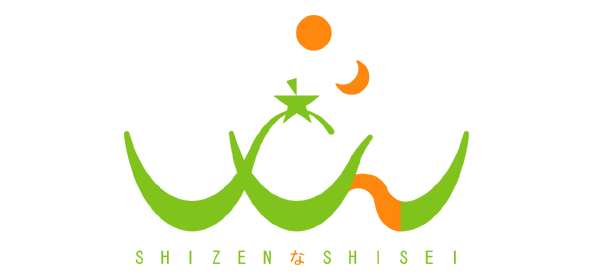       |
HOME > Shisei method
1.“Shisei and Shisei Method” | 2. BBR | 3. The axes of balance | 4. Axes disorders |
5. Practicing Shisei Method | ■Book of The Shisei method in English
Look at nature, and see yourself
SHISEI(姿斉)
PHILOSOPHY OF BALANCED BALANCE
1.“Shisei and Shisei Method”
The way to balanced balance
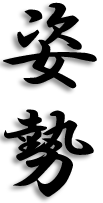 Shisei : The word “shisei” (posture) consists of two characters: 姿 (shape) and 勢 (function).
Shisei : The word “shisei” (posture) consists of two characters: 姿 (shape) and 勢 (function).
Shisei (姿勢) expresses the appearance of a person’s body, mind, and spirit.
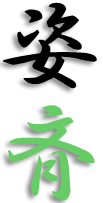 The idea behind Shisei Method is to put three things in order without deficiency
or excess.
The idea behind Shisei Method is to put three things in order without deficiency
or excess.
Shisei Method brings the postures and the attitudes of the body, mind,
and spirit into harmony with nature's rhythm.
The Culture of Posture*
During a period of more than 1,000 years, the Japanese emphasis on the
carriage of the body and on mental and spiritual attitudes has continued
unbroken. It has not only passed down behavior and discipline such as courtesy
and etiquette, it has also provided a framework for people to use their
bodies during daily life in a graceful, healthy, and efficient way.
Shisei Method is a painless and very simple technique, which was developed
through combining natural responses and elements of traditional Japanese
behavior. Its applications are wide-ranging, to health, mind, figure, and
the power of movement (including athletic ability). It naturally and firmly
helps to put in place the necessary foundations for living a satisfying
life.
Attaining balanced balance
It is possible to conceive of extreme balance, but adapting your posture
all the time is not necessary. A distorted posture is not right either.
What is important is to strike a balance between adjusting and accepting
the imperfect condition of your posture and attitudes. Nature's rhythm
teaches us that a good balance between adjustment and acceptance helps
to nurture a healthy and active life.
Shisei Method is a practical method to attain balanced balance, harmonising
nature’s rhythm and your body, mind, and spirit.
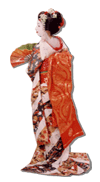 *"The Culture of Posture"
*"The Culture of Posture"
In the Asuka, Nara and Heian periods in Japanese history (the 6th to 8th
centuries), there was a lot of emphasis on aristocratic courtesy and etiquette.
In the early Kamakura period (the 12th century) the philosophy of the human
body as a tool of etiquette developed into practical techniques to enhance
the fighting ability of samurai warriors. All of the Japanese martial arts,
performing arts, and cultural activities began with posture, including
sumo (the Japanese national sport), Japanese archery, kendo fencing, judo,
karate, flower arrangement, tea ceremony, Noh dance, and Kabuki. Japan
was truly a country of the culture of posture.
2. BBR (Balanced balance response)
Subconscious actions to adjust posture
Are you aware that, without thinking, you always use one side when you unconsciously intertwine fingers, fold your arms, cross your legs or sit to one side, etc, in your daily life?

Until recently it had been said that these subconscious habitual movements
were the partial cause of distorted posture. Therefore, if you could, using
both sides equally was thought to be the right thing to do. On the other
hand, while advising many people and observing their postures, we have
come to understand that those subconscious habitual movements are natural
mechanisms which automatically correct our distorted postures, and therefore
nurture and protect our health.
Now, we have named the subconscious habitual movements "the BBR (balanced
balance response)".
These subconscious movements are practically used in Shisei Method. The
BBR is formed by two opposite responses, which we call relaxation responses
and action responses.
3. The axes of balance
Creating good posture from
awareness of the lines of balance
Concerning health of body and mind, a good figure and athletic
ability, many problems originate from the posture.
If the posture is improved, those problems will be solved.
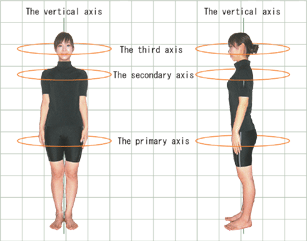
The vertical axis
The imaginary line linking the top of the head and the center point at
the line of the pelvis.
The primary axis
The imaginary line linking the two heads of the femur(next to the hip-joint).
The secondary axis
The imaginary line linking the two big nodules at the top of the upper
bones in the arms (i.e., the outsides of the shoulders).
The third axis
The imaginary line linking the two ear holes.
Anatomically, this is the line between the first and second cervical vertebrae.
The generic name for the above four axes is the axes of balance (the main
axes).
4. Axes disorders
Many problems arise from
distortions of the posture
If the posture is not using the natural force of gravity well,
distortions of the posture are exaggerated.
Then differing obstacles to smooth functioning are produced.
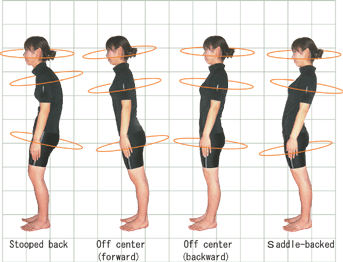
Various problems brought about
by distortions of the body
Health : stiff muscles, numbness, lumbago, knee pains, stiff shoulders, shoulder
problems due to age, neuralgia, hernias, gastrointestinal disorders, diabetes,
liver complaints, heart troubles, kidney disease, respiratory illnesses,
women's diseases.
Figure : stooped back, bowlegs, knock-knees, flat breast, drooping hips, plump
waist, facial distortion, shrinking height, bunions, etc.
Mental : diminishing concentration, mental instability, etc.
Athletic ability : slowing reactions, fading endurance, declining skills, etc.
5. Practicing Shisei Method
The BBR was applied to formulate a set of basic techniques of Shisei method
: the seido exercises.
These are reasonable and, without pain, automatically adjust the posture
comfortably and naturally. Seido, which is based on a sideways sitting
position, is introduced here.
 ① Sit down naturally with one foot next your bottock and settle yourself
as comfortably as you can.
① Sit down naturally with one foot next your bottock and settle yourself
as comfortably as you can.
 ② Next, develop a similar feeling when you sit down with your other leg
to the side. Compare both postures ① and ②. Then, choose the more comfortable
position for you and sit down again.
② Next, develop a similar feeling when you sit down with your other leg
to the side. Compare both postures ① and ②. Then, choose the more comfortable
position for you and sit down again.
 ③ Put your hands on the floor and bend your body within reason and without
pain. (Taking 8 deep breaths each time, and repeating 4 times, is called
"one seido.")
③ Put your hands on the floor and bend your body within reason and without
pain. (Taking 8 deep breaths each time, and repeating 4 times, is called
"one seido.")
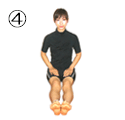 ④ After one seido, take a short rest stretching both legs.
④ After one seido, take a short rest stretching both legs.
 ⑤ Check that the less comfortable position has improved. (If the less comfortable
position has not improved, repeat one more seido).
⑤ Check that the less comfortable position has improved. (If the less comfortable
position has not improved, repeat one more seido).
 ⑥ Repeat movement ③ above once in the more comfortable position.
⑥ Repeat movement ③ above once in the more comfortable position.
 ⑦ Return to the more comfortable sideways sitting position, which completes
this Shisei method exercise
⑦ Return to the more comfortable sideways sitting position, which completes
this Shisei method exercise
■□Book of The Shisei method in English□■

▼ Contents ▼
Before beginning The Shisei method
Subconscious
actions to adjust posture
Improving posture from the :
Shoulders
(1)
Shoulders (2)
Shoulders (3)
Lumbar region (1)
Lumbar region
(2)
Lumbar region (3)
Knees (1)
Knees (2)
Knees (3)
Pelvis
(1)
Pelvis (2)
Pelvis (3)
Shoulder blades (1)
Shoulder blades
(2)
Shoulder blades (3)
Neck (1) (up and down movements)
Neck (2)
(sidewards movements)
Ncek (3) (twisting movements)
About the
Author
◆More details can be found here.


